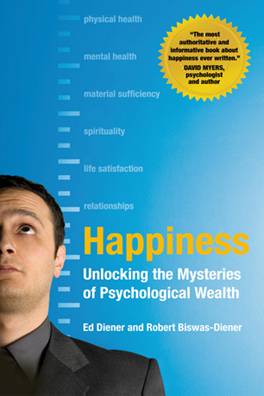
Unlocking the Mysteries of Psychological Wealth

Unlocking the Mysteries of Psychological Wealth

Ed Diener and Robert Biswas-Diener
The world’s leading expert on happiness, Dr. Ed Diener challenges our modern assumptions about the causes and consequences of happiness. Ed and his son Robert Biswas-Diener share the results of three decades of research on happiness to help unlock the mysteries of this elusive Holy Grail. In this fascinating book the father and son team presents scientific evidence revealing that happiness is not overrated, and is good for people’s health, social relationships, job success, longevity, and altruism. They also show why “super-happiness” is not a desirable goal.
________
Table of Contents
Foreword by Carol Diener
Part l: Understanding true wealth
1. Psychological Wealth: The Balanced Portfolio
2. Two Principles of Psychological Wealth
Part 2: Happy people function better
3. Health and Happiness
4. Happiness and Social Relationships – You Can’t Do Without Them
5. Happiness at Work: It Pays to be Happy
Part 3: Causes of happiness and genuine wealth
6. Can Money Buy Happiness?
7. Religion, Spirituality, and Happiness
8. The Happiest Places on Earth: Culture and Well-Being
9. Nature and Nurture – Is There a Happiness Set-Point, and Can You Change It?
10. Our Crystal Balls: Happiness Forecasting
11. Taking AIM: Attention, Interpretation, and Memory
Part 4: Putting it all together
12. Yes, You Can Be Too Happy
13. Living Happily Ever After
14. Measuring Your Psychological Wealth
Epilogue: About the Science of Happiness
Further Reading & References
Ed Diener Ph.D., is the Joseph R. Smiley Distinguished Professor of Psychology at the University of Illinois in Urbana-Champaign. He is also a senior scientist for the Gallup Organization.
Robert Biswas-Diener, known as the "Indiana Jones of positive psychology," is Program Director at the Center for Applied Positive Psychology (UK) and part-time lecturer at Portland State University (USA).
Acclaim for this Book
"This is the most authoritative and informative book about happiness ever written. That's not surprising, given that its authors are the world's leading happiness researcher and his psychologist-son, whose vocation is coaching people toward happier lives."
- David Myers, Pursuit of Happiness
"Finally the definitive book on happiness…The authors bring over thirty years of research and practice into this engaging book that reveals the secrets of psychological wealth – your true net worth – which includes your attitudes toward life, social support, spiritual development, material resources, and health. This is a landmark book that should be read not only by laypersons but also by scholars, educators, business leaders and decision-makers interested in global well-being and human happiness.”
- Jim Clifton, Chairman & CEO, The Gallup Organization
“A great gift from the leading professional scientist of happiness in the world and his son, the ‘Indiana Jones’ of positive psychology.”
- Martin E. P. Seligman, Authentic Happiness
Some Major Points in the Book:
1. Psychological wealth is more than money. It is also your attitudes, goals and engaging activities at work.
2. Happiness not only feels good, but is beneficial to relationships, work and health.
3. It is helpful to set realistic expectations about happiness. No one is intensely happy all of the time.
4. Thinking is an important aspect to happiness. Our theory of Attention, Interpretation, and Memory (AIM) helps readers increase their psychological wealth.
5. Several myths are addressed in this book:
More Details
Ordering information:
Amazon Books: ($ 16.47) www.amazon.com
Blackwell/Wiley: ($ 19.95) www.wiley.com
or USA 877-762-2974 (Code: HAP08)